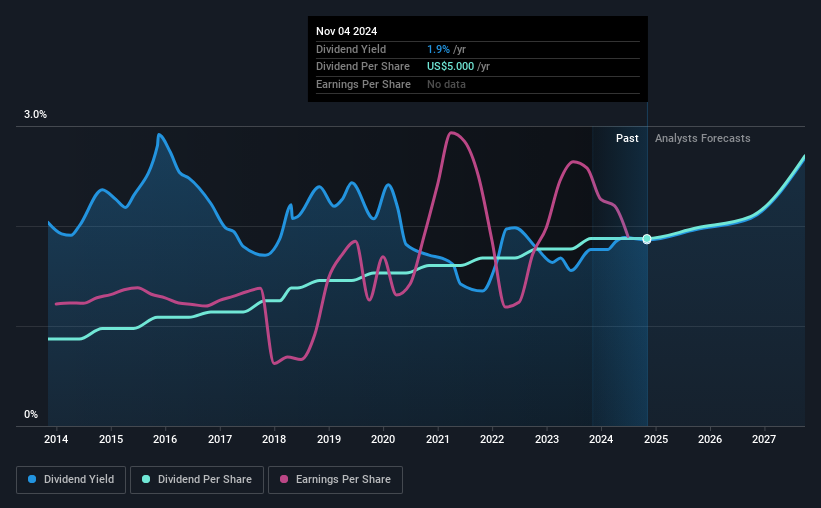- United States
- /
- Electrical
- /
- NYSE:ROK
Rockwell Automation (NYSE:ROK) Is Paying Out A Larger Dividend Than Last Year
Rockwell Automation, Inc. (NYSE:ROK) will increase its dividend on the 10th of December to $1.31, which is 4.8% higher than last year's payment from the same period of $1.25. The payment will take the dividend yield to 1.9%, which is in line with the average for the industry.
See our latest analysis for Rockwell Automation
Rockwell Automation's Future Dividend Projections Appear Well Covered By Earnings
While it is always good to see a solid dividend yield, we should also consider whether the payment is feasible. Based on the last payment, Rockwell Automation was quite comfortably earning enough to cover the dividend. This indicates that a lot of the earnings are being reinvested into the business, with the aim of fueling growth.
The next year is set to see EPS grow by 57.6%. If the dividend continues along recent trends, we estimate the payout ratio will be 39%, which is in the range that makes us comfortable with the sustainability of the dividend.

Rockwell Automation Has A Solid Track Record
The company has a sustained record of paying dividends with very little fluctuation. The dividend has gone from an annual total of $2.32 in 2014 to the most recent total annual payment of $5.00. This means that it has been growing its distributions at 8.0% per annum over that time. The growth of the dividend has been pretty reliable, so we think this can offer investors some nice additional income in their portfolio.
Rockwell Automation May Find It Hard To Grow The Dividend
Investors who have held shares in the company for the past few years will be happy with the dividend income they have received. However, Rockwell Automation's EPS was effectively flat over the past five years, which could stop the company from paying more every year. Growth of 0.7% per annum is not particularly high, which might explain why the company is paying out a higher proportion of earnings. While this isn't necessarily a negative, it definitely signals that dividend growth could be constrained in the future unless earnings start to pick up again.
We Really Like Rockwell Automation's Dividend
In summary, it is always positive to see the dividend being increased, and we are particularly pleased with its overall sustainability. Distributions are quite easily covered by earnings, which are also being converted to cash flows. Taking this all into consideration, this looks like it could be a good dividend opportunity.
It's important to note that companies having a consistent dividend policy will generate greater investor confidence than those having an erratic one. Meanwhile, despite the importance of dividend payments, they are not the only factors our readers should know when assessing a company. For instance, we've picked out 2 warning signs for Rockwell Automation that investors should take into consideration. Looking for more high-yielding dividend ideas? Try our collection of strong dividend payers.
New: AI Stock Screener & Alerts
Our new AI Stock Screener scans the market every day to uncover opportunities.
• Dividend Powerhouses (3%+ Yield)
• Undervalued Small Caps with Insider Buying
• High growth Tech and AI Companies
Or build your own from over 50 metrics.
Have feedback on this article? Concerned about the content? Get in touch with us directly. Alternatively, email editorial-team (at) simplywallst.com.
This article by Simply Wall St is general in nature. We provide commentary based on historical data and analyst forecasts only using an unbiased methodology and our articles are not intended to be financial advice. It does not constitute a recommendation to buy or sell any stock, and does not take account of your objectives, or your financial situation. We aim to bring you long-term focused analysis driven by fundamental data. Note that our analysis may not factor in the latest price-sensitive company announcements or qualitative material. Simply Wall St has no position in any stocks mentioned.
About NYSE:ROK
Rockwell Automation
Provides industrial automation and digital transformation solutions in North America, Europe, the Middle East, Africa, the Asia Pacific, and Latin America.
Excellent balance sheet established dividend payer.
Similar Companies
Market Insights
Community Narratives



